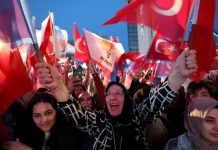
Latif Dalyan offers shirts and sweatpants at knock-down prices to Turkey’s earthquake victims from a storefront surrounded by piles of debris, Agence France-Presse reported.
The last person the 58-year-old shopkeeper wants to blame for his ruined city’s troubles is the country’s president.
“If there is one man who can make this country stand up again, it is Recep Tayyip Erdoğan,” Dalyan said near the February quake’s epicenter in the city of Kahramanmaraş.
“May God give every country a leader like him.”
Dalyan’s fervor contrasts sharply with the cries of pain and anger that rang out when the 7.8-magnitude jolt and its aftershocks wiped out swathes of Turkey’s mountainous southeast in February.
Anguished survivors listened to loved ones slowly perish under mounds of rubble in the freezing cold.
Many blamed the government and its stuttering response to Turkey’s worst disaster of its modern era for a death toll that has now surpassed 50,000.
But that fury is gradually giving way to a mixture of fatalism and reviving trust in the man this province gave three-fourths of its votes to in the last general election in 2018.
That spells trouble for the opposition’s hopes of ending Erdoğan’s two-decade domination of Turkey in new polls set for May 14.
“Nobody can be perfect and no government can be perfect,” Dalyan said. “Everyone can make mistakes.”
‘We will not campaign’
Aydın Erdem, director of the KONDA research firm, found something similar in polls conducted across Turkey’s disaster zone.
“Our surveys do not support claims that the (ruling party’s) vote dropped a lot because of what happened,” Erdem told Turkish media this week.
“The electorate is consolidating around their respective parties.”
The presidential and parliamentary votes next month are widely seen as the most important of Turkey’s post-Ottoman history.
Erdoğan and his Islamic-rooted party have shaped society in their image and tested the strength of Turkey’s secular traditions.
Critics accuse them of mismanaging the economy and using the courts to silence critics and imprison political foes.
The government’s sluggish search and rescue effort appeared to offer the united opposition a chance to capitalize on this discontent.
Cem Yıldız does not quite see it that way.
The 34-year-old deputy head of the main opposition Republican People’s Party (CHP) in the Kahramanmaraş province, has done almost no campaigning to date.
He says he fears that pushing people to vote during a moment of profound grief is both indecent and self-defeating.
“We will not campaign because the people here are in pain,” he said next to a container home that serves as his party’s temporary headquarters.
“We visit people to help them with their problems. We don’t ask for their votes.”
‘We had momentum’
The main office for the CHP, created by the secular state’s founder Mustafa Kemal Atatürk, was one of untold number of local buildings levelled or damaged by the quake.
Party officials decided to set up their new camp in a remote pocket of the city with a strong liberal lean.
Local men while away the hours in a teahouse on a street that witnessed a bloody attack by neo-Fascists on socialists and Alevi Kurds in 1978 that killed more than 100 people.
CHP supporter Mustafa Akdoğan remembers those troubled days with queasy foreboding.
“Democracy, human rights and especially the rule of law have vanished in the past four or five years,” the 67-year-old retired teacher said.
“So these elections are very important.”
But the self-imposed pause in his local party’s campaigning leaves Akdoğan less certain of victory than he was before the disaster struck.
“We had momentum before the quake,” he said. “Now, I am not sure.”
‘Afraid to say anything’
The city of Kahramanmaraş and the province had more than a million people before February 6.
Officials struggle to estimate how many remain today. Deserted streets are dotted with tent camps and families sitting outside crumbled homes.
Some locals said Kahramanmaraş was filled mostly by poorer people who either never had the chance to move out or had spent their savings living in more intact parts of Turkey.
Yasemin Tabak, a housewife, said she had no complaints about returning to Kahramanmaraş.
She recalled Erdoğan’s promise to rebuild homes within a year and smiled. “Our people have to be a little patient,” the 40-year-old said.
“May God protect our government,” her tent neighbor Ayse Ak agreed.
But two other women looking down from a hill at a vast empty space where blocks of apartments once stood suggested a quiet undercurrent of skepticism.
“People are afraid to say anything against the government here,” the younger of them said.
“They will never do it on camera or give you their name. And I’m afraid too.”















